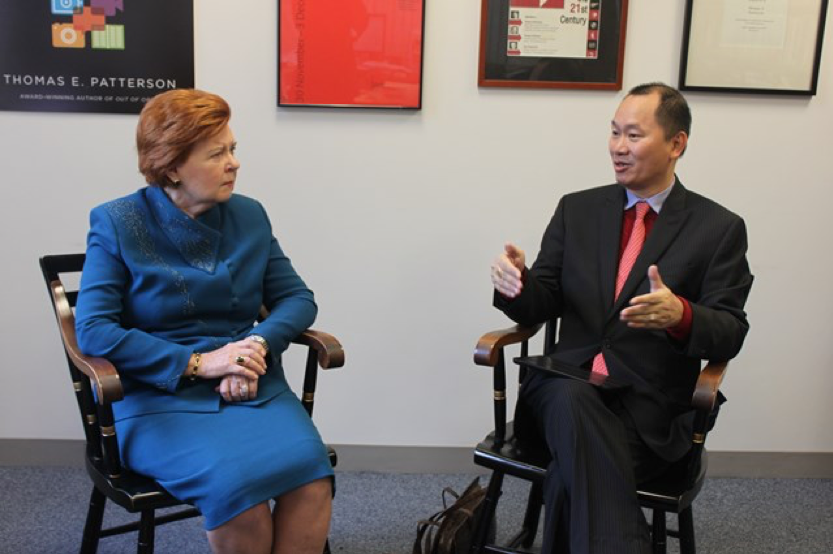
by Editor | Oct 6, 2019 | News
Vaira Vike-Freiberga, the first woman president of Latvia, and a founding member of the World Leadership Alliance–Club de Madrid will be presented with the World Leader for Peace and Security Award on October 21, in Madrid. The award will be presented by Governor Michael Dukakis, Chairman of the Boston Global Forum and Michael Dukakis Institute for Leadership and Innovation (BGF-MDI).
Vike-Freiberga currently serves as the president of Club De Madrid, the world’s largest forum of former heads-of-state and parliamentary governments. She is also a member of the International Programme Board of the Prague European Summit.
Vike-Freiberga, who served two terms as Latvia’s president from 1999-2007, is being recognized in-part for her contributions to the AI World Society Initiative–launched by Boston Global Forum and the Dukakis Institute, as well as other contributions to peace and security in the Baltics, Europe, and internationally.
Club De Madrid has also been partnering with Boston Global forum and The Dukakis Institute in in an effort to build the Next Democracy Generation using AI and AIWS models. This project addresses the main factors that impact the world’s democracies, among them new technologies and social media.
In presenting the award, Gov. Dukakis, whose organization is dedicated to international peace, security and cooperation, is expected to say:
“We’ve been fortunate to have worked with President Vike-Freiberga in recent years. The first contact with her for many of us in Boston was when she was a senior fellow at Harvard University’s Institute of Politics. Since then, she has been a frequent participant in the proceedings of the Boston Global Forum and is a member of our board of international thought leaders. She has made significant contributions for the AI World Society Initiative as well.
“She served for two terms as President of Latvia, at a time when it joined the NATO and the European Union. During her last year in office, Latvia’s economy had GDP growth of more than 10 percent, one of the highest in the world.
“Europe, too, has benefitted from her efforts. She has, for example, served as Vice President of the Reflection Group on the long-term future of the EU, was a member of the European Council on Tolerance and Reconciliation, and chaired the European Commission High Level Expert Group on Media Freedom.
“As Co-Chair of the Nizami Ganjavi International Center, she brought attention to Azerbaijan’s development and its critical role in maintaining peace and harmony in the Caucasus. A Muslim-majority country, Azerbaijan is a model for religious tolerance and cooperation.”
President Vike-Freiberga will also be recognized at the Boston Global Forum’s Global Cybersecurity Day event, to be held at noon, December 12, 2019 at Harvard University.

by Editor | Oct 6, 2019 | News
The Riga Conference 2019 will take place on October 11 and 12. This year, it attracts many governments leaders, thought leaders from Europe, and USA. As usual, President and Prime Minister of Latvia will open and conclude the conference.
Dr Artis Pabriks, Deputy Prime Minister and Minister of Defence of the Republic of Latvia,
Ms Annegret Kramp-Karrenbauer, Federal Minister of Defence of the Federal Republic of Germany
Mr Peter Hultquist, Minister for Defence of the Kingdom of the Sweden
will speak at PLENERY SESSION: COMPREHENSIVE & COLLECTIVE – BUILDING THE FOUNDATION OF NATO’S FUTURE DEFENCE
For 70 years, NATO has successfully adapted to changing political landscapes to maintain peace for its members. As the number of vulnerable domains increases, the Alliance’s collective defence must adapt once more. For decades comprehensive defence has been seen as a strategy for non-aligned countries. Soon this will no longer be the case. How will the comprehensive defence efforts of several allies strengthen the Alliance? How can a comprehensive strategy best complement the collective approach?
Dr Vaira Vīķe – Freiberga, President of the Club de Madrid, former President of the Republic of Latvia
Dr Andreas Norlén, Speaker of the Riksdag
Dr Constanze Stelzenmüller, Robert Bosch Senior Fellow, Brookings Institution
Mr Arseniy Yatsenyuk, former Prime Minister of Ukraine
will speak at PLENARY SESSION: ELITES LOSING THEIR ELECTORATE?
National elections in Western and Eastern Europe show growing support for FN, AfD and similar new populist parties. Political elites who for a long time led the European integration project, the EU accession process, and immigration policy are losing their grassroots supporters. Increasingly elite parties are distrusted in countries like Germany, Italy, Sweden, Ukraine among others. How will this development influence European policy in general? How will EU institutions like the European Parliament, European Council or Commission be affected? Will Europe become inward looking and mercantilist to appease the dissatisfaction amplified by new populist parties?
Mr. Nguyen Anh Tuan, Co-Founder of the Boston Global Forum will be a speaker of the Riga Conference 2019, at Planery Session “ Political Power in the Digital Age “.
The power of technology in the digital age is increasing day by day. Algorithms decide what information we are exposed to, what we should buy, or who we should follow. We can observe the political process increasingly playing out in the digital arena. The democratic need to find a careful balance between censorship and free speech increasingly clashes with the business models and policies of powerful, private social media platforms used by millions of users. What risks do technologies of the digital age pose to the traditional policy making process and political power?

by Editor | Oct 6, 2019 | News
Professor Alex Sandy Pentland, Director of Connection Science of MIT and Co-Founder of AIWS Social Contract 2020 and Mr. Paul Nemitz, team member of AIWS Social Contract 2020, will speak at AI World Conference and Expo 2019.
Join the Boston Global Forum, the Strategic Alliance Host of AI World, Oct 23-25 in Boston, MA – https://aiworld.com/
AI World is the industry’s largest independent business event focused on the state of the practice of AI in the enterprise. The 3-day program delivers a comprehensive spectrum of content, networking, and business development opportunities, all designed to help you cut through the hype and navigate through the complex landscape of AI business solutions. Attend AI World and learn how innovators are successfully deploying AI and intelligent automation to accelerate innovation efforts, build competitive advantage, drive new business opportunities, and reduce costs. Register for your complimentary Expo Pass here at or for your conference pass here.
AI World Society and AIWS Social Contract 2020 is a content partner of the Automation Engineering International Conference in Rome, Italy, October 23-24, 2019. The theme of the conference is Automation and Robotics for a Sustainable Future.
This International Conference on Robotics and Automation Engineering will provide an opportunity for researchers, doctors, practitioners, and educators to exchange research evidence, practical experiences and innovative ideas on issues related to Robotics & Automation Engineering. It is a global platform to explore issues of mutual concern as well as the exchange of knowledge, share evidence, ideas, and knowledge.
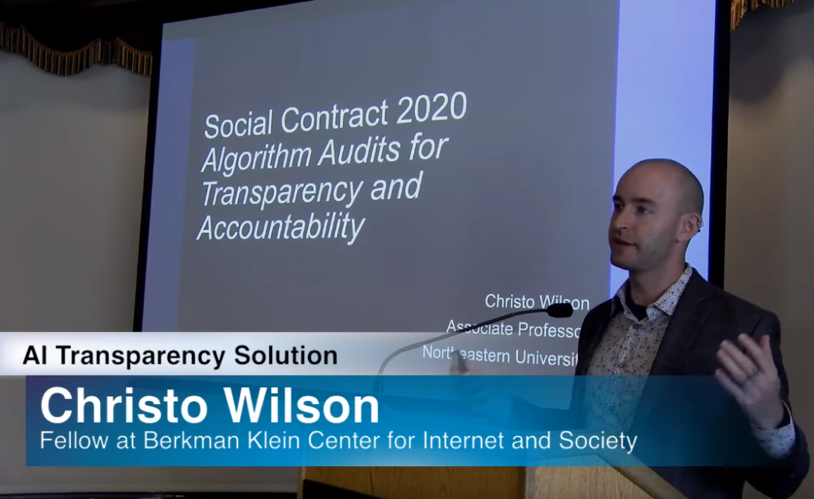
by Editor | Oct 6, 2019 | News
During AI World Society (AIWS) conference at Harvard University Faculty Club on September 23 2019, the AIWS Social Contract 2020 was initiated and promoted by Michael Dukakis Institute for Leadership and Innovation (MDI). The AIWS Social Contract 2020 is the Principles of Politics for peace, security, and better world with deeply applied AI, Internet, in which citizens have rights to be involved directly and effectively in political decisions.
To contribute to AIWS Social Contract 2020, Dr. Christo Wilson, Associate Professor at Northeastern University and Fellow at Berkman Klein Center for Internet and Society at Harvard University, presented on an important topic about “Algorithm Audits for Transparency and Accountability”. At the digital age, the data volume is increasing exponentially, intelligent systems are increasing ubiquitous and level of sophistication is also increasing rapidly. This causes a multiple high risks including privacy violations via ubiquitous surveillance, entrenched discrimination, predatory commerce as well as biased and manipulation information curation. Therefore, the regulation and enforcement are essential from data collection (what can be collected, by whom, for what purpose) to the system capabilities (facial recognition, deepfakes, inference of sensitive attributes) for good outcomes in the society (no discrimination, unbiased presentation of information).
Within a strong expertise on security, privacy, and transparency on the web, Professor Christo developed an innovative scientific measurement technique as Algorithm Auditing. The method is developed to understand when an algorithmic system is present, data collection and sharing practices, as well as behavior of the system. In particular, Algorithm Auditing uses controlled experiments to understand whether black-box algorithmic systems are unfair or discriminatory, understand online tracking and develop techniques to improve online privacy, as well as measure and improve public key infrastructures like SSL/TLS and DNSSEC. This research has brought the fruitful results such as comprehensive “maps” of information sharing between online advertisers and trackers, incorrect prices sent to passengers by Uber, price discrimination by e-commerce and travel websites, gender discrimination in resume search tools used by recruiters, racial and gender discrimination on “gig-economy” services.
Professor Christo’s presentation contributed to an important research methodology and solution on Transparency and Accountability, which is one of fundamental components on AIWS Ethics and Practice Index. Hence, the AIWS conference is an elevated platform to share its commitment to the constructive and development of AI with a great contribution and collaboration from prestigious universities, think tanks, non-profits, firms and other entities for promoting ethical norms and practices in the digital age.
Download the presentation here
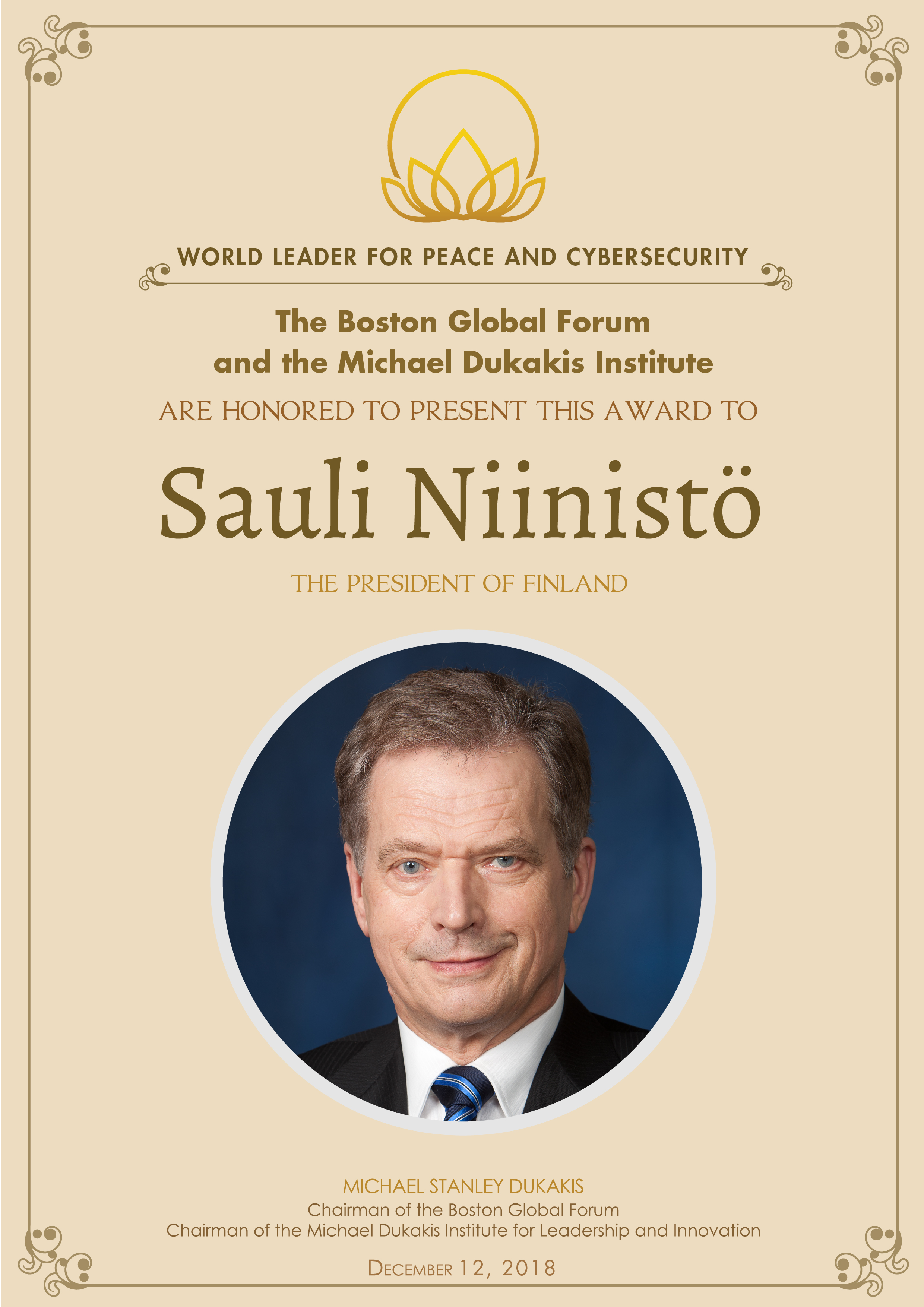
by Editor | Sep 29, 2019 | News
This is the concluding message from the Statement by the President of the Republic of Finland, Sauli Niinistö, at the 74th General Debate of the United Nations General Assembly, New York, 24 September 2019.
“Respect for universal human rights is the key to a peaceful and just world. Finland strongly believes in multilateral cooperation on human rights, with the Human Rights Council as its cornerstone. Accordingly, we have announced Finland’s candidature to the Human Rights Council for the period from 2022 to 2024.
As the United Nations is entering its 75th anniversary, it could well be more important than ever. Our common global problems cry for common global solutions. Together, we are also better able to seize new global opportunities. There is no organization better placed to lead that work than the United Nations. To unleash its full potential, it is our responsibility to reduce the trust deficit.”
The Boston Global Forum honored President of Finland Sauli Niinistö with the World Leader for Peace and Security Award on Global Cybersecurity Day, December 12, 2018 at Loeb House, Harvard University.
The statement can be found here.
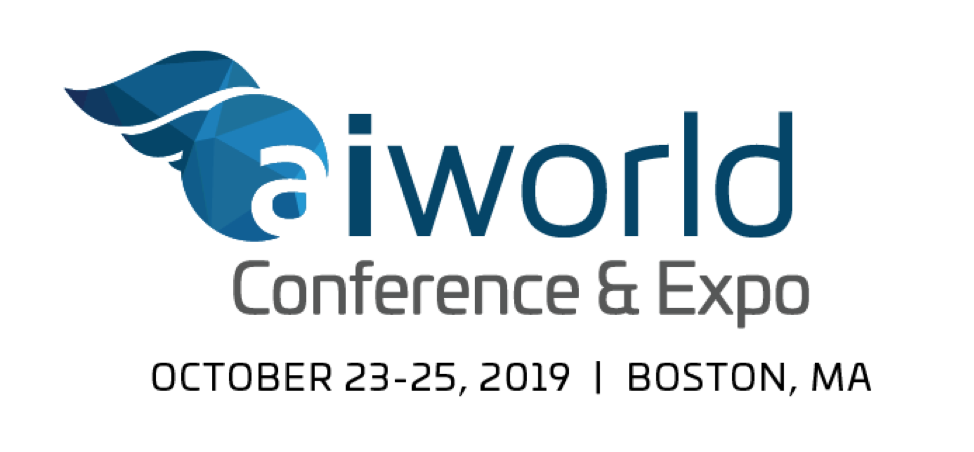
by Editor | Sep 29, 2019 | News
Professor Alex Sandy Pentland, MIT co-founder of the Social Contract 2020- Social Contract for the 21st Century and Professor David Silbersweig, Harvard Medical School, Board Member of the Boston Global Forum, will be speakers at AI World Conference and Expo 2019.
AI World is the industry’s largest independent business event focused on the state of the practice of AI in the enterprise. The 3-day program delivers a comprehensive spectrum of content, networking, and business development opportunities, all designed to help you cut through the hype and navigate through the complex landscape of AI business solutions. Attend AI World and learn how innovators are successfully deploying AI and intelligent automation to accelerate innovation efforts, build competitive advantage, drive new business opportunities, and reduce costs. Register for your complimentary Expo Pass here at or for your conference pass here
Join the Boston Global Forum, the Strategic Alliance Host of AI World, Oct 23-25 in Boston, MA – https://aiworld.com/
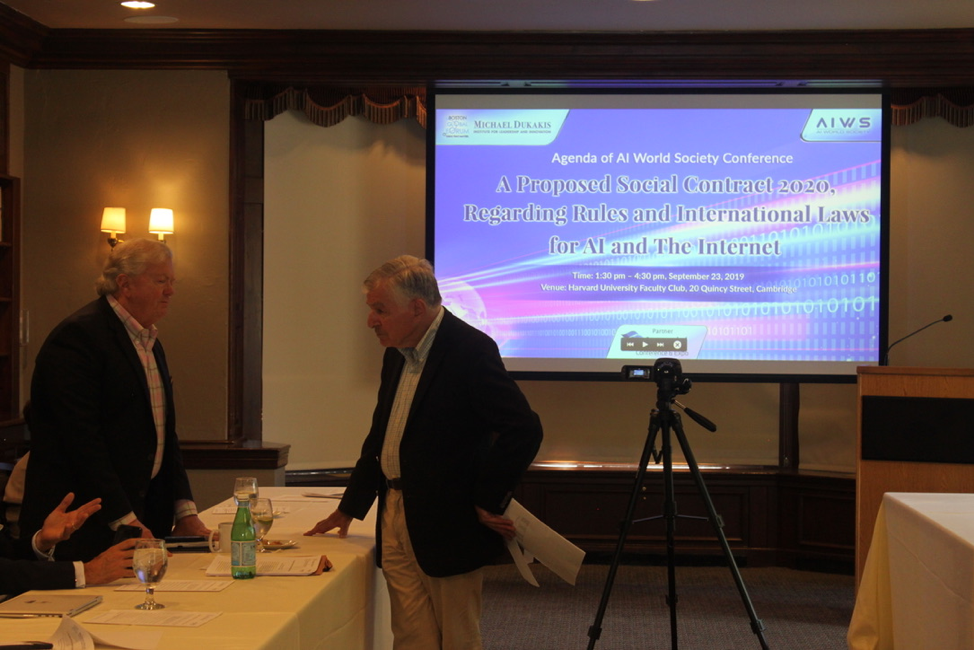
by Editor | Sep 29, 2019 | News
New concepts and principles of political power in AI and Internet age include 7 concentrations of power: 1. Executive Branch, 2. Legislative Branch, 3. Judicial Brach, 4. Business Sector, 5. Civil society organizations, 6. People, 7. AI Assistants.
These concepts are a part of the Social Contract 2020-Social Contract for the 21st Century. The concepts of 7 concentrations of power and the Social Contract 2020 were officially announced at the AI World Society Conference on September 23, 2019, at Harvard University Faculty Club. This is first time that the Business Sector and AI Assistant are considered concentrations of power.
Authors include top thought leaders such as Governor Michael Dukakis, Democratic candidate for the President of the United States in the 1988 Election; Vint Cerf, one of father of the Internet; Professor Alex Sandy Pentland, MIT; Professor Nazli Choucri, MIT; Professor Thomas Patterson, Harvard Kennedy School; Professor David Silbersweig, Harvard Medical School; Professor Christo Wilson, Northeastern University; Nguyen Anh Tuan, Co-founder of the Boston Global Forum; Paul Nemitz, Principal Adviser, Directorate General for Justice and Consumers, the European Commission; and Michel Servoz, Special Adviser to the President of the European Commission.
Former head of states, prominent scholars and leaders from Harvard, MIT, Tufts, University of Tokyo, etc. attended and discussed under moderation of Governor Michael Dukakis.
The authors and team will continue discuss and attend to issues:
- Laws that promote transparency and accountability in public and private sector data usage.
- Laws that facilitate and/or require independent audits of automated decision systems.
- How Citizens, Civil Society organizations, and AI Assistants can help in nurturing and enforcing laws/values/standards and contribute to governmental and private-sector decision-making.
- Control and management of global government mechanisms.
- Control and monitoring of AI Assistants to ensure that they comply with laws/norms/standards.
- How to enforce governmental respect and to execute the Social Contract 2020 – Social Contract for the 21st Century and their international laws, norms, standards.
The Government of Massachusetts and MIT Connection Science Center are sponsors for The Social Contract 2020 and AI World Society.
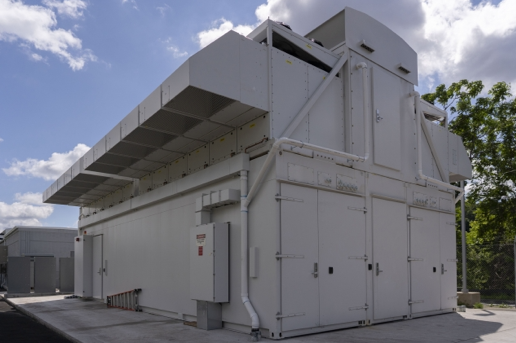
by Editor | Sep 29, 2019 | News
The new TX-GAIA (Green AI Accelerator) computing system at the Lincoln Laboratory Supercomputing Center (LLSC) has been ranked as the most powerful artificial intelligence (AI) supercomputer at any university in the world. The ranking comes from TOP500, which publishes a list of the top supercomputers in various categories biannually. The system, which was built by Hewlett Packard Enterprise, combines traditional high-performance computing hardware — nearly 900 Intel processors — with hardware optimized for AI applications — 900 Nvidia graphics processing unit (GPU) accelerators. These capabilities will support projects across the laboratory’s R&D areas, such as improving weather forecasting, accelerating medical data analysis, building autonomous systems, designing synthetic DNA, and developing new materials and devices.
TX-GAIA, which is also ranked the No. 1 system in the U.S. Department of Defense, will also support the recently announced MIT-Air Force AI Accelerator. The partnership will combine the expertise and resources of MIT, including those at the LLSC, and the U.S. Air Force to conduct fundamental research directed at enabling rapid prototyping, scaling, and application of AI algorithms and systems.
To share its commitment to the constructive and development of AI, Michael Dukakis Institute for Leadership and Innovation (MDI) also established the Artificial Intelligence World Society (AIWS) to collaborate with MIT and other universities, as well as think tanks for promoting ethical norms and practices in the use of AI.
The original article can be found here.

by Editor | Sep 29, 2019 | News
Services and products delivery across various sectors has been affected by technology and science innovation, and healthcare is not an exception. In recent years, the introduction of AI (artificial intelligence) received an extemporary welcome in the industry.
AI is still a new technology, and it has not yet explored the industry to its full potential. However, even at its infant stage, it is still applicable in various aspects of the healthcare industry. Some of the common sectors that apply the use of AI include medical research institutes, hospitals, and health insurance. It is also involved in information and data management in regards to healthcare.
AI tools application in medical diagnosis is linked to its ability to identify trends and analyze large data volume. The tools are also adapted to determine condition development from medical images and analyzing health records too.
Several ethics regulates the healthcare sector. They are therefore required to show at most human empathy during the provision of healthcare services. On the other hand, machines are mere without any morality form. Irrespective of the AI tools efficiency, its involvement poses a threat to the morality of healthcare. With tight work ethics, therefore, the systems and AI tools involvement can lead to unethical direction hence contribute to adverse outcomes. If doctors are introducing AI into their workflow, it helps them to operate within their work ethics and minimize risks. The AI application in healthcare is aligned with AI World Society (AIWS) Ethics and Practices Index to promote AI development for more transparency and avoiding bias to help people achieve well-being and happiness.
The original article can be found here.








